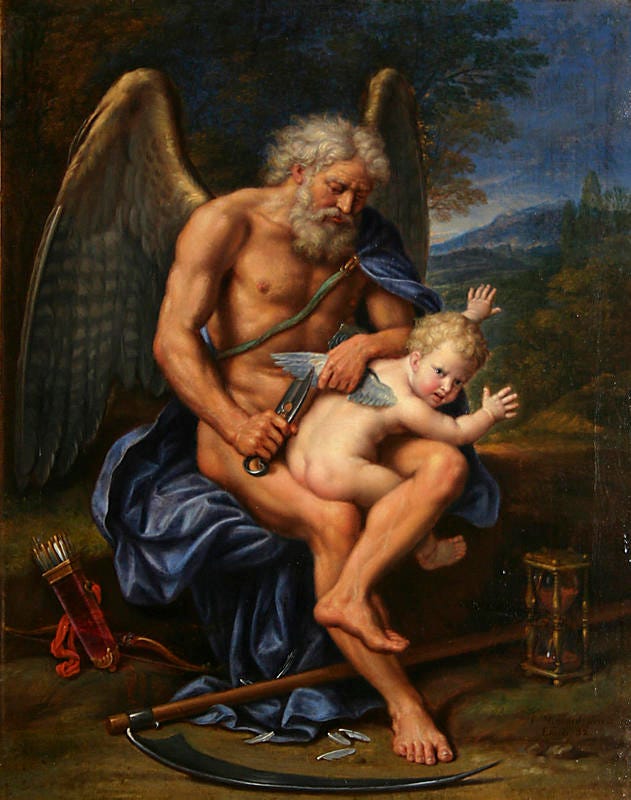In Greek mythology and later literature, Kronos was the Lord of the Universe and the source of life and death. He personified linear time, making his way into history and art as a man turning the zodiac wheel, or wearing a thick grey beard, wielding a scythe for harvesting (or clipping Cupid's wings).

And then there was Kairos, a winged god with one hand holding the scales of fate and the other inching to tip them. Where Kronos personified time as we know it, Kairos personified numinous moments which, when met with lucky chance, led to novelty and surprise and memories that rarely fade.
When we talk of time, we give it quantitative definitions, call it by numbers. And yet there are pockets in our lives when this ever-ticking clock seemed to slow down for us, even stand still. And what better way to understand this than to turn to the Greeks?
As usual, the ancient Greeks were way ahead of us in running away from homogenising experiences. Nothing came simple — neither love, nor cognition, nor time. We see time as uni-dimensional today, but clocks and calendars are only one sort of time: Chronos.
Chronos is linear, quantifiable and measurable; it is the grid upon which we plot events for historical recollection. It's a one-way train moving from a determinate past into a definite future. But like anything quantifiable, we start worrying about running out — the possibility of scarcity makes it even harder to hold on to. As Goya depicted in his terrifying painting, "Saturn Devouring His Son", Chronos will devour us if we don't keep track of it.
Kairos is serendipitous, presenting us with unlimited possibilities that could tip the scales of fate. It's the perfect moment, the opportune moment, the moment that makes us think, "It can't get better than this". You know the phrase, "the time is ripe?" Yeah, that's Kairos.
I've been thinking a lot about Kairos and its time-capsule nature lately, especially when I look up topics for this newsletter. Creations from a thousand years ago reverberate in the 21st century; ancient philosophy gives us the wisdom to weather unprecedented changes. As James Baldwin put it,
"You read something which you thought only happened to you, and you discover that it happened 100 years ago to Dostoyevsky. This is a very great liberation for the suffering, struggling person, who always thinks that he is alone. This is why art is important. Art would not be important if life were not important, and life is important."
It reminds me of Csikszentmihalyi's flow, the secret of happiness and being absorbed in the moment. It's also not always forward-looking — you can travel back in time with Kairos, and come back to the present with Chronos.
But today, everything has a future deadline: our beauty products, our software, even our planet. It's hard not to think of time as going by too fast, too quickly. Algorithms have manufactured the process of discovering "new" things; inspiration and awe are well-timed. In all this homogenising, where do we meet serendipity?
Take a risk
Kairos can't be planned, so one has to go out of their way to find it. In any context, that would mean avoiding the cookie-cutter and relying on whim and instinct. It would mean forgoing the perfectly curated travel package in favour of an unplanned trip; every small defiance of the order of things is an opportunity.
Follow internal pulls
The pandemic tossed many of our carefully planned schedules out the window, forcing us to struggle for a semblance of orderliness. Yet in the middle of all this, one might experience internal pulls; demands from the subconscious to go something else, like take a walk.
To find Kairos, it's worth giving into these pulls and slowing down to enjoy them. When you decide to amble along instead of speed-walk, you might stumble upon something that has a lasting impact — a single flower in a barren landscape, or an idea that turns the chapter of your latest project.
When we live in Kairos time, we don't fear it. We see seasons of our lives beyond how they spread out on a calendar grid; we stop expecting milestones to follow a linear path. Kairos is the moment between time, without a time, a deep pocket of stillness in an otherwise shallow stream.




Loved the analogy and your assertion that kairos / Chaos is necessary in the world of curated calendars and days!